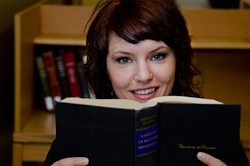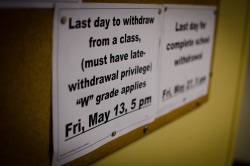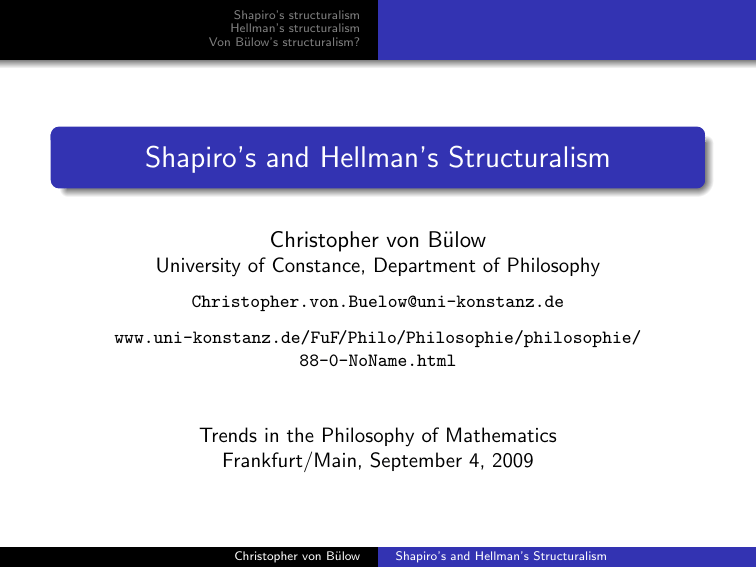UPDATE: I wrote a shorter version of this article for The Huffington Post. That was recently published here.
If I were a conspiracy theorist, I’d wonder whether science is out to systematically destroy religion one idea at a time. Over the last few centuries, when the church has gone head to head with science, the church hasn’t done so well. Now we’re here at the beginning of the 21st century and of the mysteries that remain, religion continues to be a safe house for only a couple of them. One is the whether humans are free to make choices between good and evil and whether we’re responsible for those choices. It’s not looking good for religion.
 As far as science is concerned, free will is tricky. Most of us seem to think that we, at least some of the time, face genuine choices and are responsible for the decisions we make. I can choose to drive or take the bus. I can help the needy or help myself. I can choose to be with this person or that one. In the West, our entire legal system hinges on whether doing one thing over another is up to us. If it is, we’re responsible for our actions and should pay the penalty for making bad choices.
As far as science is concerned, free will is tricky. Most of us seem to think that we, at least some of the time, face genuine choices and are responsible for the decisions we make. I can choose to drive or take the bus. I can help the needy or help myself. I can choose to be with this person or that one. In the West, our entire legal system hinges on whether doing one thing over another is up to us. If it is, we’re responsible for our actions and should pay the penalty for making bad choices.
But this is not squaring well with a modern view of the world. Many scientists and philosophers are realizing that if the rest of the world is governed by natural laws and chance and humans are a part of the world, then humans must be governed by natural laws and chance too. Consider this argument by philosopher Galen Strawson. He says that in order to ultimately be responsible for our actions, we would have to be responsible for the way we now are since the things that define us–our beliefs, desires, goals, environment–provide the basis for the decisions we make. But much of the factors that contributed to the way we now are were out of our control. We aren’t responsible for our DNA. We didn’t choose our parents or where we were born and grew up. We had little influence over the schools we attended or why we may like red wines over white. So, since we’re not responsible for much of the way we now are, we can’t ultimately be responsible for our actions free (a succinct summary of this argument appeared in an article for the New York Times recently).
William Provine, Professor of Biology at Cornell University, has argued strongly against free will mainly based on Darwinian science. But the idea is motivated by what he sees as negative social outcomes by those who believe in it. He stated in a debate with theist Philip Johnson, “There are no gods, no purposes, and no goal-directed forces of any kind …. There is no ultimate foundation for ethics, no ultimate meaning in life, and no free will for humans, either. What a horrible idea.”
Philosophers like Daniel Dennett, Patricia Churchland, and Derek Pereboom agree that given what we currently know about man’s place as a wholly physical being in a physical world, free will is not tenable. Pereboom concludes that belief in beings with free will “is not credible given our best physical theories. Consequently, no position which affirms the sort of free will required for strong accountability is left standing."
Many recent, popular movies are touching on the subject bringing the issue front and center to a wider audience. “You don’t have free will David. You have the appearance of free will.” Fixer Terrence “The Hammer” discloses this uncomfortable fact to David Norris in George Nolfi’s recent cinematic adaptation of Philip K. Dick’s short story, The Adjustment Team (films such as Inception, The Book of Eli are other examples that come to mind). The movie nibbles on the question, “Are we able to do otherwise?” In the mouth of an actor, free will’s elegy may carry little weight in the real world. But it is being echoed by many in the philosophical and scientific communities and the implication, if true, for religion, ethics, sociology and psychology are enormous.
Some are recommending we just face facts and give up the notion. In a recent review of David Eagleman’s book Incognito Jeffrey Foss just comes out with it: "Free will is an illusion." His recommendation? "Get over it." According to Foss, Eagleman attempts to show that humans essentially are biological robots fitted with hardwired machinery that explains our behavior much better than some squishy idea like "the soul." While science may provide some wiggle room for those who "wish to live the life of freedom and responsibility . . . the writing is on the wall" he warns. (As an example of a theist who believes modern science provides the wiggle room Foss alludes to, Loyola philosopher Paul Moser argues that quantum physics provides plenty of theoretical room for freedom of the will. He also makes the positive claim that acting unselfishly towards others–something he believes some people clearly do–is only possible if God exists and that, in turn, can provide evidence that he in fact does exist. In my interview with Dr. Moser, he stated, “… in human conscience God bears witness to the divine moral character as represented in the law of God, thereby holding people accountable.”)
This does not bode well for many core religious teachings. After all, if the freedom to choose is dissolved in the acid of natural law (or divine sovereignty–another can of worms  altogether), a lot of what religion teaches has to be dissolved with it. We’d no longer be responsible for evil or good, or be able to choose to live the way God wants us to. We’d also have to give up things like sin and eternal punishment. Really, without free will, religion isn’t all that ethically distinctive from agnosticism or atheism. Worse, it may even mean that God is responsible for evil and suffering. If God is in control of everything but we’re not free to choose, God must be responsible for child abusers and torturers. Only by creative theological gymnastics (that I suspect most of us don’t really buy into anyway) can one escape the logic.
altogether), a lot of what religion teaches has to be dissolved with it. We’d no longer be responsible for evil or good, or be able to choose to live the way God wants us to. We’d also have to give up things like sin and eternal punishment. Really, without free will, religion isn’t all that ethically distinctive from agnosticism or atheism. Worse, it may even mean that God is responsible for evil and suffering. If God is in control of everything but we’re not free to choose, God must be responsible for child abusers and torturers. Only by creative theological gymnastics (that I suspect most of us don’t really buy into anyway) can one escape the logic.
Well, there is another way. We can try to affirm the science but just deny the conclusion–a kind of "power through it" approach. Theist, geneticist, and former director of the Human Genome Project, Francis Collins, states in his book The Language of God that "… the existence of free will and of order in the physical universe are inexorable facts." He believes that even in a world where science would nearly exhaustively explain everything, free will still will be a viable notion. "Scientists will discover an increasing level of molecular detail about the inherited factors that undergird our personalities, but that should not lead us to overestimate their quantitative contribution. Yes, we have all been dealt a particular set of cards, and the cards will eventually be revealed. But how we play the hand is up to us."
This approach focuses more on what experience seems to present us with (or what a sacred text teaches) rather than what we come to learn by analyzing facts about the world. It comes down to how much we trust our intuitions. If science were to demonstrate that we really don’t love our kids should we stop caring for them? If scientists somehow proved that we really don’t enjoy red wine or fried dough (we just think we do), will we drink water only and eat plain rice at every meal? Many claim that we know we’re free and that’s enough to keep acting as if we are regardless of what the science and philosophy says.
In an article for The Art of Theory, Yale Law professor Paul Kahn frames a discussion of free will in the context of a theological view of politics. Political discourse, if it is to occur at all, has to be done in the context of alternate possibilities. He is somewhat critical of what he sees as the Kantian view that truth is defined solely in terms of what reason dictates. We may use reason to draw various conclusions about matters legal and moral. But, says Kahn, most of the time reason doesn’t and, a fortiori, shouldn’t dictate our actions.
We may have no answer to a moral argument, but still we may be convinced that the right way to act lies in another direction. We may, for example, decide that, under the circumstances, the particularity of love is more important than the universality of a moral rule. We may even acknowledge that what we are doing is morally wrong, but still believe that it is what we should do….
No principle will tell me whether I should act on care or justice when they point in different directions. That hardly means that I am the passive observer of the diverse causes of my own behavior. I must decide what to do. The possibility of decision in a causal world may be mysterious, but that does not mean that the experience of decision is mysterious. Just the opposite: we are entirely familiar with our own freedom and thus with the process of deciding.
This intuition is strong and arguments like these suggest that they should carry just as much if not more weight than what reason may dictate.
My view is that if we take the evidence coming out of science and philosophy seriously, freedom of the will is hard to maintain. Yet I make plenty of decisions every day and have a strong sense that I’m entirely responsible for them. I can at least say this: if I’m being asked to pick between the science and my intuitions, I choose not to.









